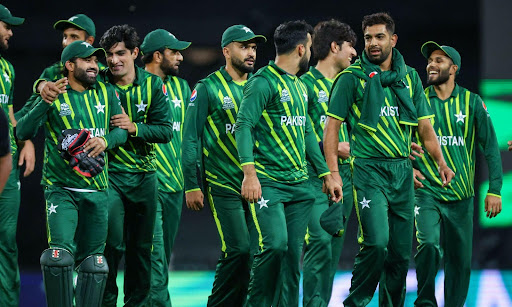Pakistan moves up to No. 1 in ODIs after a 3-0 sweep against Afghanistan

No Naseem Shah, no Haris Rauf, no issue, Pakistan declared as they put together yet another outstanding bowling display to defeat Afghanistan by a decisive score of 59 runs and won the ODI series 3-0. Importantly, they quickly ascended to the top of the ODI standings with the victory, just in time for the Asia Cup.
When they batted first on a two-paced Colombo surface, Babar Azam and Mohammad Rizwan contributed attritional half-centuries that enabled them reach 268 for 8. Afghanistan responded, but they never really got their bearings on a pitch that seemed to pick up speed under the lights.
Mujeeb Ur Rahman made a valiant effort to temporarily stymie Pakistan’s plans by scoring the fastest fifty by an Afghan hitter in ODIs—off 26 balls—and eventually wrapping up on a 37-ball 64. The aim, however, turned out to be a bridge too far.
In the end, they were dismissed for 209 in 48.4 overs, with Shadab Khan collecting 3 for 42, the best bowling performance.
Afghanistan needed a solid start from their openers to help them with their 269-yard chase, but they never got one. Ibrahim Zadran’s inability to bat first did not help matters because he spent the final few minutes of the first inning off the field and was forced to serve time before leaving.
When facing the Pakistani fast bowlers, Faheem Ashraf caused the most trouble, leaving Riaz Hassan and Rahmanullah Gurbaz completely at sea.
Shaheen Shah Afridi was given the ball to nip about, but at first, his radar wasn’t on. The lines and lengths Ashraf used, however, were flawless.
The batters kept guessing as he kept the ball in the outer off-center channel and back of a length. Gurbaz, who missed a straight ball and was caught in front of the stumps after missing a flick, was the important victim that he managed to remove.
According to DRS, the ball would have struck the leg bail. Following Zadran’s 11-ball duck, Ashraf claimed him. In the third ODI, the two hitters could muster only 5 runs off 26 balls after scoring a combined 231 runs off 252 balls in the second.
For the third wicket, Hashmatullah Shahidi and Riaz added a quick 30-run partnership, but it took 61 balls. All along, there were plays and misses as the Pakistani bowlers adhered to a strategy and, more crucially, produced.
Shadab stopped Riaz’s risky 66-ball 34 and sent Shahidi back in the same over as Afghanistan stared death in the face. From 60 for 2, they dropped to 75 for 6 and then 97 for 7. It seems that another abrupt finish was inevitable at that time. But Mujeeb and Shahidullah Kamal maintained the fort.
For the ninth wicket, they contributed 57 runs off 42 balls, with Mujeeb scoring the majority of the runs. He was the only Afghan batsman to display purpose, smashing five fours and five sixes in his innings before being out for a hit-wicket. He got his chances, he took them, and he really annoyed the bowlers.
Pakistan’s previous innings consisted of two distinct halves. The final 20 overs produced 165 runs, compared to the first 30 overs’ 103 runs. The batters did not appear at any point to be at ease. For the third wicket, Babar and Rizwan contributed 110 runs, although it took 145 balls and they had 84 dots. In the end, their innings served as the foundation for Pakistan’s batting.
The under attack Fazalhaq Farooqi was hit for five fours in the 20 balls he faced as Fakhar Zaman jumped on him early. On the other side, Imam-ul-Haq battled through it all. He often played maidens off Mujeeb and lacked timing in general.
Fakhar found his rhythm, and Pakistan still managed to get going at a touch over four an over. However, a bowling change allowed the hosts to reenter the contest. In his first game of the series, Gulbadin Naib had an immediate impact.
Before Fakhar tried a release shot, a few outswingers had already beaten his outstretched blade. As a result, he misfired a length ball straight up, and Riaz successfully intercepted the catch. Then Naib eliminated the Imam as well. He sprinted down the track in an attempt to catch a short-of-a-length ball outside off, but he could only manage a thick edge, leaving Gurbaz to finish the play.
After Babar and Rizwan joined forces in the 13th over, scoring runs became a difficult challenge for the following few overs. In the following 18 overs, only four fours were hit, and the run rate fell to below 3.50.
But after a few drinks, the pair flipped a switch. Between overs 31 and 40, Pakistan scored 85 runs to boost the ante. The first to break free was Rizwan, who needed only 69 balls to earn his eighth ODI fifty. Babar quickly followed suit, needing 77 balls to accomplish the milestone.
However, neither batter managed to reach the triple digits. Rizwan was lbw by Fareed Ahmed while Rashid Khan forced an outside edge off Babar’s blade. As Pakistan lost 3 for 9 in 15 balls in the meantime, Afghanistan also got rid of Saud Shakeel. But Mohammad Nawaz and Agha Salman saw to it that Pakistan came out on top.
For the seventh wicket, they put together a 61-run partnership off of 47 balls. Afghanistan made mistakes after playing excellently in the field for the first half of the innings. There were numerous errors and missed opportunities as Pakistan easily passed 250 runs by scoring 80 runs in the final ten overs.


